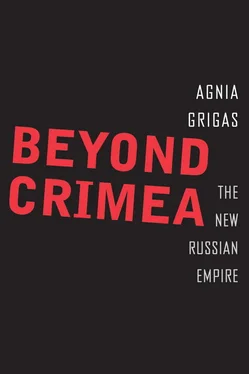THE YELTSIN ERA: EARLY COMPATRIOT POLICIES
In the early 1990s, Russian foreign policy was still in its infancy and thus it took some time for Moscow to start formally conceptualizing compatriots and formulating official compatriot policies. 37Under Yeltsin’s presidency six important policies would eventually emerge that related to Russian compatriots (see Table 1). The delay from 1991 to 1994 in addressing the burning problem of millions of Russian compatriots left outside the borders of Russia was due in part to Russia’s domestic political difficulties of the early 1990s. 38In addition, poor economic conditions prevented implementation of policies to assist the compatriots and reinforced the belief that potential migration of Russians to the motherland would only be an economic burden that all hoped to avoid. 39While Yeltsin’s seeming desire for ethnic Russians and Russian speakers to integrate in their “host” countries could be seen as a sign that Russia was ready to support the sovereignty of the newly independent republics, the facts on the ground soon demonstrated that compatriots could be a means of influence.
Despite the fact that neither the term “compatriot” nor “compatriot policy” was yet articulated, as early as in 1992 there were indications that compatriots were being used for Moscow’s foreign policy and particularly its military agenda. A good example could be the negotiation process to withdraw some 120,000 Soviet troops from the Baltic States (completed in Lithuania in 1993 and in Latvia and Estonia in 1994). During its negotiations with the Baltic capitals, the Russian side grounded its military presence in the Baltic States as a means of safeguarding the rights of compatriots in the region. 40The withdrawal of the Russian troops was halted because in Yeltsin’s words in 1992, he was “profoundly concerned over numerous infringements of the rights of Russian speakers.” 41Later the same year Yeltsin also stressed that development of Russian-Baltic relations would “largely depend on the situation of the Russian-speaking population.” 42As will be shown in Chapter 5, the basis of Yeltsin’s concern was probably first of all the fact that two Baltic countries, Estonia and Latvia, decided not to grant automatic citizenship to individuals (including many Russians) who had immigrated there during the Soviet era, but also Moscow’s lack of preparations to house the returning military and their families. Refusing to withdraw troops by citing excuses regarding compatriots was among the first signs of efforts to utilize the diaspora for Moscow’s aims and influence abroad. Similar statements linking Russia’s foreign policy toward a target country with the conditions of its Russian and Russian-speaking population were repeated over the next decades by Yeltsin’s successors in relation to a number of former Soviet republics.
In the context of rising tensions over Russian compatriots, Sergei Stankevich, historian and presidential counselor from 1992 to 1993, emerged as one of Russia’s early policymakers in this area. Together with the political opposition, Stankevich argued that Russians in the near abroad should be seen as an integral part of the Russian nation. 43He was among the first to suggest that the Russian diaspora was not a potential problem, but on the contrary, a source of power in the former Soviet space. 44Looking back, Stankevich seems a surprising figure to have become instrumental in conceptualizing the compatriot policies that would become a tool for Russia’s reimperialization efforts. A former perestroika and glasnost activist, the baby-faced former history teacher was still in his thirties when he became Yeltsin’s adviser. His fall from grace was as rapid as his rise—in 1996 he was charged with graft related to a $6 million blowout of public funds for a Red Square gala concert and retreated to live abroad. 45But before his ousting, in 1993 Stankevich authored and presented to Yeltsin a report on the Russian diaspora entitled “On Urgent Measures for Socio-cultural Cooperation between Citizens of the Russian Federation with Their Compatriots Abroad.” It was the first official document addressing the compatriot issue and contains possibly the earliest formulation and usage of the term as it would come to be employed in the coming decades. The Stankevich report called for official measures to establish links between compatriots and the Russian state as well as public organizations to implement this task. 46
Table 1
Compatriot Policy Documents under Boris Yeltsin, 1993–1999
| DATE |
DOCUMENT |
SUMMARY OF CONTENTS |
| January 1993 |
Report on Urgent Measures for Sociocultural Cooperation between Citizens of the Russian Federation with their Compatriots Abroad |
The first official document addressing the compatriot issue and containing possibly the earliest formulation and usage of the term. |
| 11 August 1994 |
Presidential Decree No. 1681, Guidelines on State Policy regarding Compatriots Living Abroad a |
First document in the field of policies toward compatriots abroad, regardless of the failure to give a clear definition of the term “compatriot.” Document also supported the idea of dual citizenship. |
| 31 August 1994 |
Resolution of the Russian Government No. 1064, List of Primary Measures to Support Compatriots Abroad b |
Supplemented Presidential Decree No. 1681 (above). |
| 8 December 1995 |
Declaration on Support of the Russian Diaspora and Protection of Russian Compatriots c |
First official definition of compatriots: “all the natives of the USSR and Russia and all their descendants regardless of their nationality and ethnicity, language, religion, gender, occupation and place of residence and other circumstances.” d |
| 17 May 1996 |
Resolution of the Government No. 590, Action Program for Protecting Compatriots Abroad e |
Declared a need to create “a legal definition of the concept ‘compatriot’ and its further use in the legislation.” fStated that Russia was ready “to assist governments of newly independent states” gin ensuring that Russians enjoyed the full range of their rights. |
| 24 May 1999 |
Federal Law on the State Policy of the Russian Federation Concerning Compatriots Abroad No. 99-FZ h |
This document regulated relations with compatriots. The term “compatriot” was automatically applied to all persons who in the past lived in the former USSR, or their descendants (but excluding the descendants of members of titular nations of the foreign states). |
Source: Compiled by the author.
Notes
a. Ukaz Presidenta Rossiyskoy Federatsii “Ob osnovnykh napravleniyakh gosudarstvennoy politiki Rossiyskoy Federatsii v otnoshenii sootechestvennikov, prozhivayushikh za rubezhom” ot 11 avgusta 1994 g., № 1681, http://base.consultant.ru/cons/cgi/online.cgi?req=doc;base=EXP;n=218892 .
b. Postanovleniye Pravitelstva Rossiyskoy Federatsii “O merakh po podderzhke sootechestvennikov za rubezhom” ot 31 avgusta 1994 g. N 1064, http://www.consultant.ru/document/cons_doc_LAW_106359/ .
c. Deklaratsiya Gosudarstvennoy Dumy Federalnogo Sobraniya Rossiyskoy Federatsii “O podderzhke rossiyskoy diaspory i o pokrovitelstve rossiyskim sootechestvennikam,” http://igrunov.ru/gdrf/sng/sngarchive/declar_sng.html .
d. Ibid.
e. Postanovleniye Pravitelstva Rossiyskoy Federatsii ot 17.05.1996 № 590 “O programme mer po podderzhke sootechestvennikov za rubezhom,” http://www.lawmix.ru/pprf/108396/ .
f. Ibid.
g. Ibid.
h. Followed by a number of amendments, the most significant in July 2010 (see below, Table 2). Federalnyi zakon ot 24.05.1999 № 99-FZ “O gosudarstvennoy politike Rossiyskoy Federatsii v otnoshenii sootechestvennikov,” http://base.consultant.ru/cons/cgi/online.cgi?req=doc;base=LAW;n=150465 .
Читать дальше












